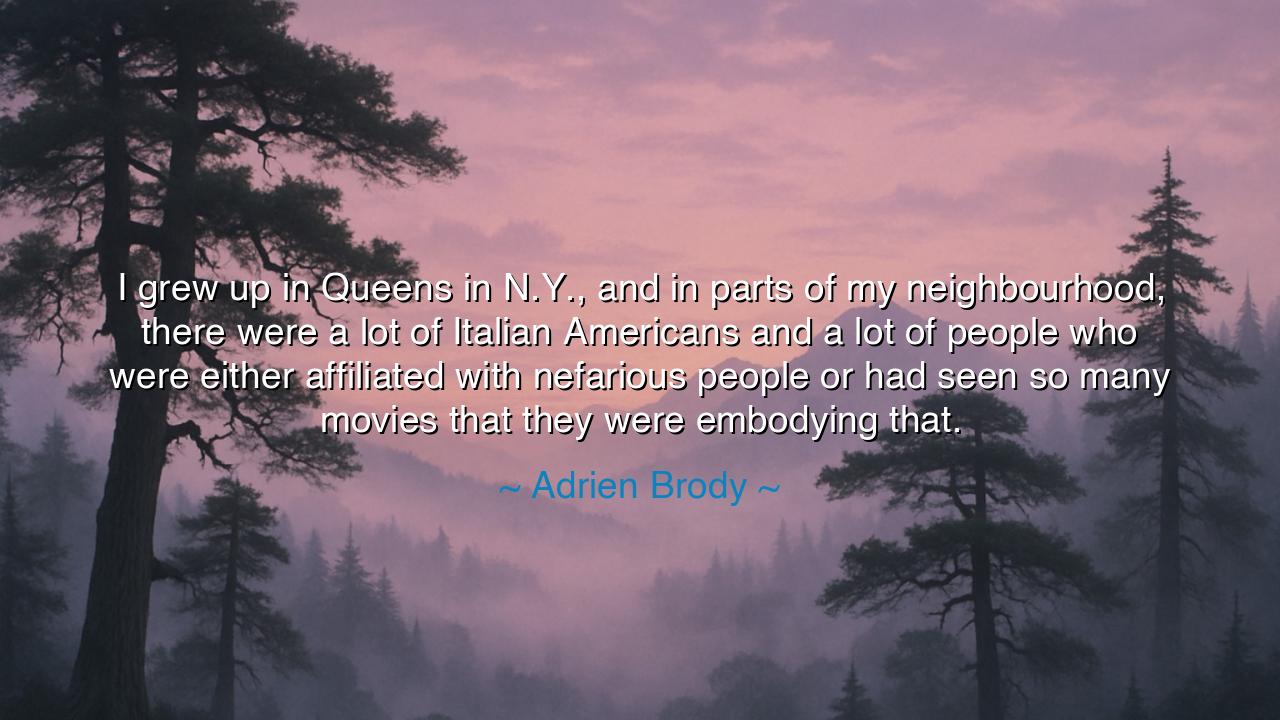
I grew up in Queens in N.Y., and in parts of my neighbourhood
I grew up in Queens in N.Y., and in parts of my neighbourhood, there were a lot of Italian Americans and a lot of people who were either affiliated with nefarious people or had seen so many movies that they were embodying that.






Hear me now, children of the future, for there is wisdom in the tale of those who walk through the shadows of their environment, and in the story of a man who rose from the streets to see the world in a new light. Adrien Brody, a man who has lived among the contrasts of society, once said: "I grew up in Queens in N.Y., and in parts of my neighbourhood, there were a lot of Italian Americans and a lot of people who were either affiliated with nefarious people or had seen so many movies that they were embodying that." These words, simple yet powerful, reflect the mosaic of influence that shapes a person’s life, and the way in which identity, both personal and cultural, can be woven from the threads of history, perception, and the world around us.
Queens, a land where the multitudes of different cultures meet, has long been a crucible of transformation. It is here that new immigrants bring with them the legacy of their ancestors, the values of old lands, and the dreams of new lives. But Brody’s reflection highlights a strange twist in the tale of these communities. In certain corners of Queens, the air was thick with the presence of Italian Americans, a group whose identity had been forever shaped by the powerful imagery of the mafia and the portrayal of underworld figures in movies and popular culture. Yet, as Brody pointed out, there were many in the neighborhood who seemed not just to be influenced by these images but to embody them, as though they were actors in a drama that had become too real.
This connection between identity and media is not a new one, children. Throughout history, societies have often defined themselves through the stories they tell, the myths they create, and the roles they assign to the people within them. In the ancient world, for example, the Greeks and Romans celebrated the heroes and villains of their epic tales, and often, these figures became models to live by. But the modern world has taken this to a new level—through the movies, the music, and the stories that permeate our daily lives, we begin to live out the roles we see around us, adopting behaviors, ideals, and even mannerisms that seem to echo those of the screen. Brody’s words reflect this phenomenon, where the boundary between reality and fiction begins to blur, and a person can become so consumed by the world of film that it begins to shape their very existence.
Consider the story of the Italian American experience in America—one that is often painted in broad strokes, depicting families tied to the underworld through the lens of movies like The Godfather. But, children, understand that reality is more complex. While some may have lived lives influenced by crime and secrecy, others sought simply to build new lives in a land that promised opportunity. And yet, the power of cinema and storytelling has a force that is undeniable. When the world you see on screen reflects certain aspects of your own life, it is easy to blur the lines between who you are and who you might be portrayed to be. This is the lesson of Brody’s observation—the power of media to shape perception, and in turn, the ways in which individuals may conform to these images.
There is a deeper lesson here, children, that transcends time and place. The influence of culture is a mighty force, shaping not only what we believe but also who we become. Identity is not a solitary construct, but something that is woven from the threads of those around us—the media, the myths, the stories that we share. This truth can be seen in the ancient world as well, where warriors often adopted the values of their societies—honor, strength, and loyalty—and shaped their lives around them. But as Brody’s words remind us, we must be cautious not to lose ourselves in the stories that others tell. While stories can guide us, they can also limit us if we do not recognize their power and choose to write our own tales.
Children, as you grow and move through the world, remember this lesson: Do not let others’ stories define who you are. Be aware of the forces that shape you, whether they come from your family, your culture, or the movies you watch. Know that your identity is yours to create, and while stories can offer guidance and wisdom, they should never dictate your path entirely. In the world of Queens, as in the world of the ancients, there is a constant battle between what is real and what is imagined. Do not be swayed by the illusion of the screen, but seek your own truth—one that is built from your own experiences, your own values, and your own understanding of the world.
The path forward is one of discernment, children of the future. Embrace the influences that serve your growth, but recognize when a story becomes a prison. Live the life that is truly yours, not one confined by the images of others. And in doing so, you will not only know yourself but also be a beacon for those who, like Brody’s neighbors, may find themselves lost in the shadow of the stories they have been told.






AAdministratorAdministrator
Welcome, honored guests. Please leave a comment, we will respond soon